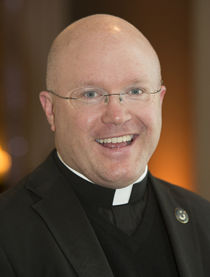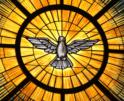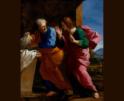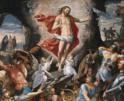
Faith
The name of God, Pope Francis recently reminded us in a book length interview, is mercy.

Landry
An ecclesiastical holy year is meant to influence everything the Church does during that year and therefore the extraordinary Jubilee of Mercy ought to mark in a special way the holiest week of the Church's calendar. Holy Week is Mercy Week par excellence. The events we celebrate are the culminating expressions of Jesus' mercy and for that reason mercy provides Holy Week's profoundest interpretive key. As we prepare to relive these saving events, it's important to grasp how through them Jesus emphasizes and extends his mercy -- and to open ourselves up more deeply than ever to receive and respond to this redeeming power.
On Palm Sunday we first demonstrate our openness to God's action in our life by welcoming Jesus with Palm Branches that symbolize victory -- in Jesus' case, triumph over sin and death -- shouting, "Blessed is he who comes in the name of the Lord!" The name of God, Pope Francis recently reminded us in a book length interview, is mercy. But Palm Sunday calls us to persevere in that openness, not allowing our holy "Hosanna!" to be transformed into a corrupt "Crucify him!" as it did for those in ancient Jerusalem. Later, as we proclaim this Year St. Luke's version of the Passion, we focus on several elements of mercy found uniquely in the third Gospel: Jesus' words of mercy from the Cross for sinners in general, "Father, forgive them for they know not what they do!," and then for one sinner in particular, "Today you will be with me in paradise!," as well as Christ's personal prayer for Peter and for us that our faith may not fail but that after we've converted we'll strengthen others.
On Holy Thursday, the Church in her liturgical rubrics instructs priests to preach on the three mysteries being celebrated that night, all of which feature God's mercy. The first is the washing of the feet, which is not just an act of humble loving service that we're called to emulate, but as Pope Benedict has stressed, a sign of the Sacrament of Confession: Christ washes our feet -- the part of us that has contact with the "dirt" of the world -- because the rest of our body has been already been bathed in Baptism. The second mystery is the gift of the Eucharist in which Jesus gives us his Body and Blood "for the forgiveness of sins" and remains with us always until the end of time. The third is the institution of the ministerial priesthood through whom Jesus not only perpetuates his Eucharistic self-gift but also forgives us our sins, as he will empower the first priests to do in the Upper Room on Easter Sunday night. The prayerful adoration of the Blessed Sacrament that takes place until Midnight is an opportunity for us, like Peter, James and John, to pray that we may not undergo -- and fail -- the test of fidelity.
Good Friday is the Day of Mercy par excellence, which shows us that there is nothing that the Lamb of God won't do to take away our sins. It's the day of penitential fasting and abstinence on which we begin the Novena of Divine Mercy. In the readings for the Commemoration of the Lord's Passion, Isaiah reminds us that Jesus was "pierced for our offenses, crushed for our sins" but "by his stripes we were healed." The Letter to the Hebrews encourages us "confidently to approach the throne of grace to receive mercy and find grace for timely help." St. John's Passion summons us to "behold the One whom they have pierced" and see the "blood and water" that flows from Jesus' pierced side as a fount of mercy for us. The "beloved disciple" also shows us how to live the Passion and experience its merciful fruit together with the Mater Dolorosa, the Mother of Mercy, to whom Jesus out of mercy entrusts us. And we, barefoot, venerate the Cross on which hung the Savior, asking that by Christ's mercy we, too, may be crucified with Christ so that we might rise with him, glory in his Cross and find it in our power and wisdom.
At the Easter Vigil, we celebrate the triumph of God's mercy, exulting in the Easter Proclamation over the "happy fault that earned so great, so glorious a redeemer" and proclaiming that "the sanctifying power of this night dispels wickedness, washes faults away, restores innocence to the fallen, and joy to mourners." St. Paul in the Epistle reminds us that through Baptism we have entered into Christ's death and resurrection and therefore we experience by God's mercy a "newness of life" no longer "in slavery to sin." We make an existential, and not just verbal, renewal of our Baptismal promises -- rejecting Satan, his empty promises and evil works and proclaiming of faith in our Triune God of Mercy -- and then are sprinkled with the newly blessed water after praying to God, "You made the water the instrument of your mercy." The solemn triple Alleluia sung before the Gospel, and the jubilant double Alleluia at the dismissal, are both a literal "Praise the Lord!" for the triumph of his merciful love.
Finally on Easter Sunday, as we jubilantly sing in the Psalm refrain, "This is the day the Lord has made; let us rejoice and be glad," we chant in the Psalm itself: "Give thanks to the Lord, for he is good, for his mercy endures forever!" And in the beautiful Easter Sequence sung before the Gospel, as we offer our thankful praises to the Paschal Victim, we proclaim, "A Lamb the sheep redeems; Christ, who only is sinless reconciles sinners to the Father."
Mercy is the key that unlocks the great depths of the mysteries we celebrate during Holy Week. Let us pray for each other that, by God's mercy, this upcoming Holy Week during this extraordinary Jubilee will be what God wants it to be: the most profound week of our life.
- Father Roger J. Landry is a priest of the Diocese of Fall River, Massachusetts, who works for the Holy See’s Permanent Observer Mission to the United Nations.
Recent articles in the Faith & Family section
-
Through to PentecostFather Robert M. O'Grady
-
Behold the ManArchbishop Richard G. Henning
-
Living a Life of GratitudeMaureen Crowley Heil
-
New morningScott Hahn
-
Easter and its datingMsgr. Liam Bergin























